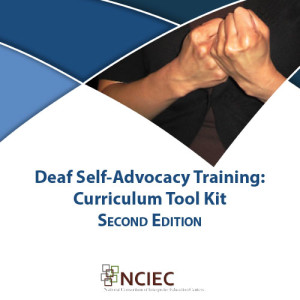Deaf Self-Advocacy Training Toolkit

The NCIEC is proud to partner with the Deaf Community to bring you the Deaf Self-Advocacy Training program.
Effective advocacy for interpreting services has been a long-time concern of Deaf Community leaders. With RSA funding support since 2005, DSAT is a curriculum designed to be taught by Deaf, hard of hearing and DeafBlind trainers to other Deaf, hard of hearing and DeafBlind consumers.
This specialized curriculum is devoted to teaching deaf individuals to self-advocate for effective interpreting services. The content of the curriculum includes concepts of self-esteem and self-determination, the law, ethics of working with interpreters, video relay interpreting, preparing for self-advocacy, and how to effectively tap resources.
The overall curriculum is rich and complex curricula of text, PowerPoints, videos, electronic Braille and more! It is comprised of three independent curricula:
- Deaf-Self Advocacy Training (DSAT)
- Deafblind Self-Advocacy Training (DBSAT)
- Train the Trainer (for experienced consumer trainers)
A preview of the DSAT introductory chapter is shown below.
The curriculum was first unveiled in 2010. Since that time more than 2,000 Deaf, hard of hearing and DeafBlind consumers have attended a DSAT consumer training and more than 250 Deaf, hard of hearing, and DeafBlind individuals have been trained a DSAT Trainers.
Access the Tool Kit Online
How to Get It
You can download the resources contained in the Toolkit DVD from the links below. On this site, the curriculum is separated into three curricula downloads and one download of the video vignettes that support the curricula.
How to Use It
Begin by downloading the curriculum of your choice. It is important that, for each training or workshop that you download, you read the Read Me First! It will help guide you through the particular curriculum. The video vignettes are an integral part of the training. Each vignette is tied to a particular module.
Hard Copy Access for Trainers
If you are a current Master Trainer or a Consumer Trainer, you may request student and evaluation materials at deafselfadvocacy@gmail.com. Please provide the following information:
Name of Trainer:
Type of training (consumer or train the trainer):
Date(s) of Training:
Location of Training:
Number of Participants:
Mailing Address where to send the materials:
It is important that only Deaf, hard of hearing or Deafblind individuals serve as trainers, facilitators or mentors of this curriculum. Moreover, it is important that only Deaf, hard of hearing or Deafblind individuals attend DSAT as participants.
